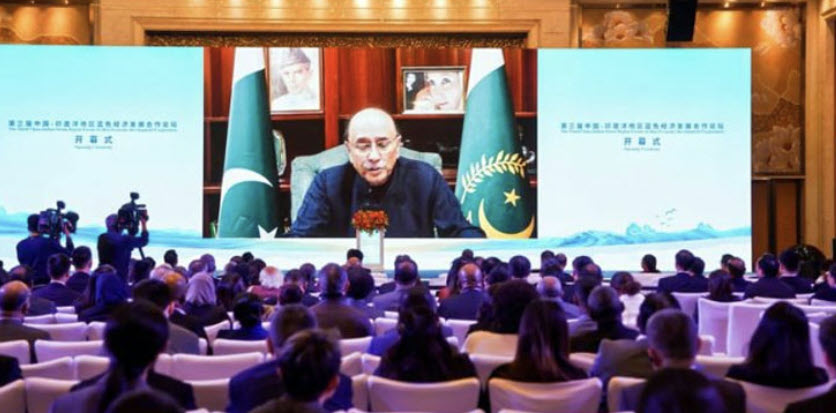President Zardari reiterates commitment to marine cooperation

On Monday, President Asif Ali Zardari reaffirmed Pakistan’s dedication to enhancing regional marine cooperation. He emphasized the importance of peace, progress, and sustainability in the Indian Ocean region. His remarks came during the third China-Indian Ocean Region Forum on Blue Economy Cooperation, held in Kunming, China. The forum took place from December 14 to 16 and was organized by the China International Development Cooperation Agency (CIDCA). President Zardari participated via a video message, highlighting the need for collective action among nations.
The president pointed out the pressing challenges facing the ocean, such as climate change, pollution, and ecosystem degradation. He stressed that these issues require a united approach to harness the ocean’s potential effectively. “Pakistan stands ready to partner with all stakeholders to promote marine cooperation,” he stated. This commitment reflects Pakistan’s broader strategy to ensure that the Indian Ocean remains a bastion of peace and sustainability.
Zardari also noted that the future of global economic growth will be driven by the East, given its vast population and resources. He underscored the ocean’s significance as a shared lifeline and a source of immense economic opportunities. By focusing on sustainable practices, Pakistan aims to enhance its blue economy, which includes initiatives like the National Maritime Policy and the Living Indus Project. These efforts are designed to protect ecosystems and combat pollution, ensuring a healthier marine environment for future generations.
Enhancing Economic Opportunities through Maritime Development
President Zardari highlighted several key initiatives that Pakistan is undertaking to boost its blue economy. One of the most significant projects is the development of Gwadar Port under the China-Pakistan Economic Corridor (CPEC). This port is being transformed into a regional connectivity hub, which is expected to drive trade and maritime economic growth. The strategic location of Gwadar Port positions Pakistan as a vital player in maritime trade routes, enhancing its economic prospects.
In addition to Gwadar, the president mentioned Pakistan’s efforts to formulate a National Maritime Policy. This policy aims to promote sustainable fisheries and marine conservation. By focusing on these areas, Pakistan seeks to ensure that its marine resources are utilized responsibly and sustainably. The Living Indus Project is another initiative aimed at protecting ecosystems and addressing pollution in the region.
Zardari also praised the partnership between Pakistan and China under the Belt and Road Initiative. He emphasized the importance of knowledge exchange and technological advancement in marine conservation. This collaboration is crucial for developing sustainable practices that can benefit both nations and the broader region. The president expressed optimism about the outcomes of the forum, believing it will pave the way for greater economic cooperation among member countries.
Collective Action for a Sustainable Future
During his address, President Zardari commended the efforts of CIDCA and the Global Development Initiative by China. He appreciated their focus on embedding sustainability in the forum’s goals. The inclusion of capacity building and island nations in the agenda aligns with Pakistan’s vision of transnational collaboration and environmental stewardship. This approach is vital for addressing the challenges faced by marine ecosystems and ensuring their preservation for future generations.
The third China-Indian Ocean Region Forum aims to bring together leaders, policymakers, and experts from across the region. It serves as a platform to explore opportunities for maritime collaboration and sustainable development. President Zardari expressed hope that the forum would lead to collective efforts to protect marine resources. He believes that promoting the blue economy is essential for the benefit of future generations.
